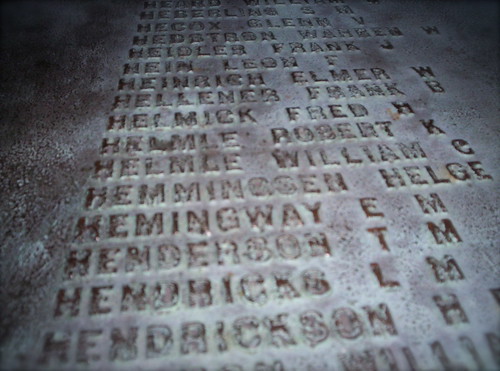
Ernest Hemingway's name on the World War I monument in Scoville Park, Oak Park IL. by Oak Park Cycle Club on flickr.
When I was in the fifth grade, they made us read Old Man and the Sea. I’ve hated Hemingway ever since.
It’s too bad really. I liked The Killers enough to watch two versions of it on consecutive nights. And he was an impressive character in William Kennedy’s novel, Changó’s Beads and Two-Tone Shoes. His work must have something going for it for him to be one of the titans of modern literature.
So I had mixed feelings going into In Our Time. The back cover refers to it as a collection of short stories, but they seem less like short stories than vignettes of varying length. And it feels less like a collection than a collage, or a sequence. The scenes, though sometimes unrelated, fit together to say something larger than the sum of the parts.
I see the connection between Hemingway’s simple straightforward “just the facts” writing and hardboiled fiction. Ellroy probably took the style to an extreme with his increasingly pruned language starting with LA Confidential. I wonder if Hemingway’s style was in part a reaction to his time. The beginning of the twentieth century saw life quickly going from a gas-lit, horse and buggy world to cars and planes and electricity and radio. In those circumstances, lives would have gotten busier, the pace faster, and Hemingway’s sparse style would have been a natural fit. In our own time, life is even busier, and we’re sending messages in 140 characters and telling stories in six words.
Besides my fifth grade experience, the other thing I think of when Hemingway is mentioned is this annoying 80s synth-pop. Enjoy.
